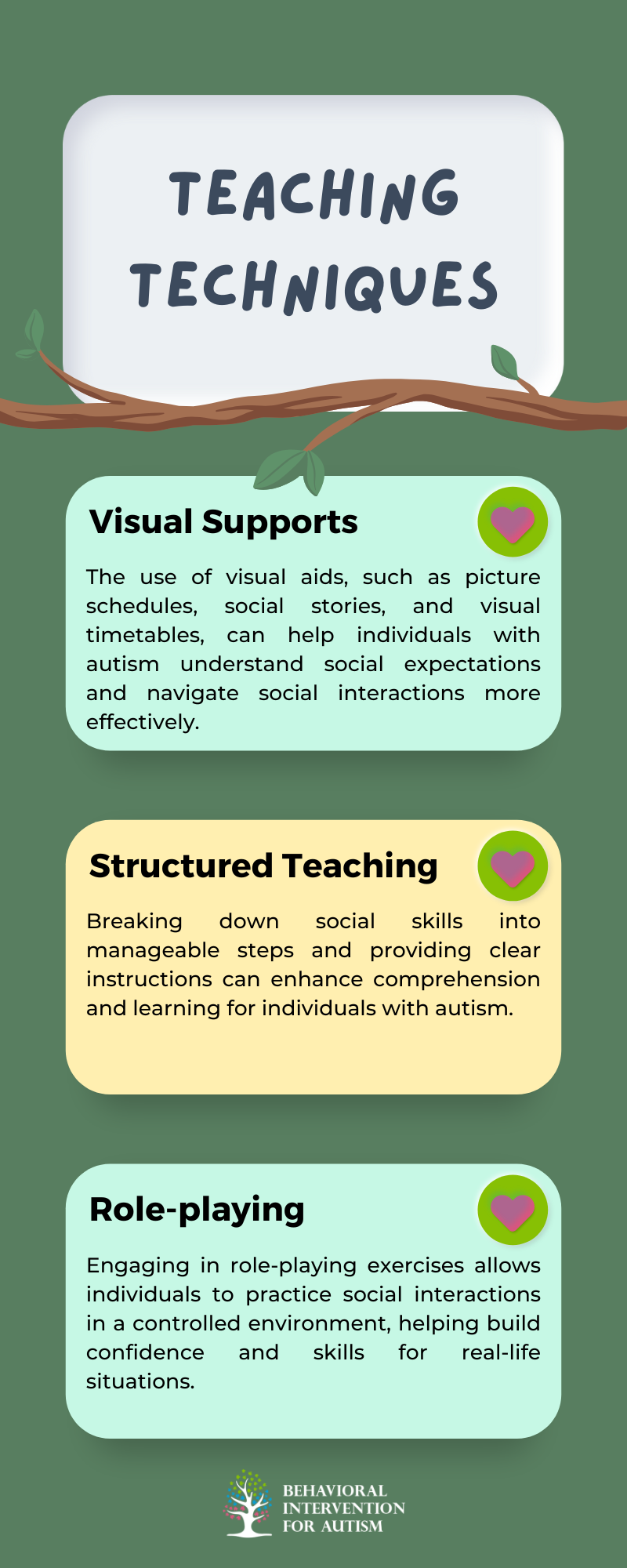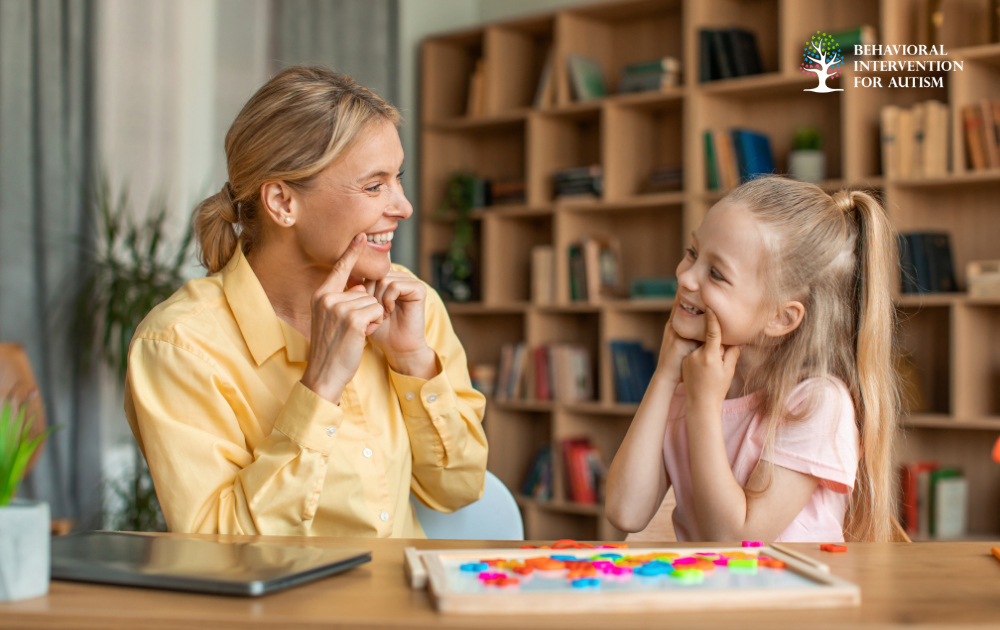
Table of Contents
Considering autism social skills involves recognizing their importance and the challenges individuals with autism face.
Strategies to Enhance Social Skills
Improving social skills in individuals with autism relies on effective teaching techniques and active parental involvement, both of which are essential for successful interventions.
Teaching Techniques
Various teaching techniques are available to support individuals with autism in developing important social skills. Strategies outlined in the Autism Speaks’ School Community Tool Kit offer valuable resources for educators and therapists working with individuals on the autism spectrum. These techniques include:

Role of Parents
Parents play a crucial role in supporting the development of social skills in children and individuals with autism. Research has shown that parental involvement can significantly impact the effectiveness of social skills interventions. Some ways in which parents can contribute to enhancing social skills include:
- Reinforcement at home: Parents can reinforce the social skills training their child receives in school or therapy sessions by practicing social scenarios at home and providing opportunities for real-life application.
- Communication with educators and therapists: Collaborating with teachers and therapists to align strategies and goals can lead to a more cohesive approach to improving social skills.
- Creating a supportive environment: Establishing a supportive and understanding home environment where social interactions are encouraged can foster the development of social skills in individuals with autism.
Incorporating effective teaching techniques and actively involving parents enables individuals with autism to enhance their social skills and navigate social situations with confidence and success.
Professional Support for Social Skills
Individuals with autism benefit greatly from professional support in enhancing their social skills. This support often comes from a variety of professionals who specialize in working with individuals on the autism spectrum. Let’s explore the key roles that special education teachers, speech pathologists, and social skills groups play in improving autism social skills.

Special Education Teachers
Special education teachers play a crucial role in supporting individuals with autism in developing their social skills. These educators are trained to create individualized learning plans that cater to the unique needs of each student. Through structured learning activities and personalized interventions, special education teachers help individuals with autism navigate social interactions more effectively.
Special education teachers may use visual aids, social stories, and role-playing scenarios to teach social skills in a clear and understandable manner. By creating a supportive and inclusive learning environment, these professionals empower individuals with autism to build confidence and engage with others in meaningful ways.
Speech Pathologists
Speech pathologists, also known as speech therapists, are instrumental in addressing communication challenges often associated with autism. In addition to working on language development, speech pathologists focus on improving social communication skills. They help individuals with autism better understand social cues, express their feelings and thoughts, and engage in conversations with others.
Through structured therapy sessions and targeted interventions, speech pathologists support individuals in developing pragmatic language skills essential for successful social interactions. These professionals collaborate with families and other caregivers to reinforce communication strategies and promote social engagement both at home and in the community.
Social Skills Groups
Social skills groups offer a supportive and structured environment for individuals with autism to practice their social skills in real-life scenarios. Led by professionals such as special education teachers or speech pathologists, these groups provide a platform for individuals to interact with peers, learn social norms, and apply learned skills in social settings.
Participating in social skills groups allows individuals with autism to engage in group activities, enhancing collaboration, cooperation, and social problem-solving skills. These groups emphasize building social confidence and fostering relationships in a safe, supportive environment.
Collaboration among special education teachers, speech pathologists, and social skills groups is essential for helping individuals with autism improve their social skills. By utilizing the expertise of these professionals and the structured environments they create, individuals with autism can enhance their social interactions, form meaningful connections, and succeed in diverse social situations.
Specialized Social Skills Programs
Individuals with autism often benefit from specialized social skills programs that cater to their unique needs and help them navigate social interactions more effectively. Two prominent programs in this field are the PEERS program at UCLA and the application of Social Thinking Concepts.
PEERS Program at UCLA
The Program for the Education and Enrichment of Relational Skills (PEERS), created at UCLA, is a thorough 16-week intervention designed to enhance social skills for those on the autism spectrum. This program focuses on teaching practical social skills and techniques that are crucial for building and maintaining meaningful relationships. PEERS covers a wide range of topics, including conversational skills, choosing appropriate friends, handling teasing and bullying, and even dating etiquette.
One of the unique aspects of the PEERS program is its incorporation of parents or caregivers into the learning process. Parents attend separate sessions to learn how to support and reinforce the social skills taught to their child during the program. This holistic approach ensures that the individual receives consistent support both during and after the program.
Social Thinking Concepts
Social Thinking, developed by expert Michelle Garcia Winner, provides a framework for understanding and improving social skills in individuals with autism. This concept emphasizes teaching children with autism how to navigate social situations by focusing on their thoughts, emotions, and intentions, as well as those of others. Social Thinking teaches individuals how to interpret social cues, understand others’ perspectives, and engage in reciprocal interactions.
Incorporating Social Thinking concepts into social skills therapy helps individuals with autism develop essential skills like perspective-taking, flexible thinking, and problem-solving in social contexts. These strategies enhance social competence and promote successful interactions across various settings.
Both the PEERS program at UCLA and the application of Social Thinking Concepts have shown promising results in improving social skills and enhancing the quality of life for individuals with autism. These specialized programs offer structured and evidence-based approaches to support individuals in developing the skills necessary to engage meaningfully with others and navigate social relationships successfully.
At Behavioral Intervention for Autism, we specialize in providing top-notch ABA therapy in Florida that focuses on developing these crucial social competencies. Our compassionate team tailors each program to fit the unique needs of every individual, ensuring they receive the support necessary for success. If you’re ready to empower your loved one with the social skills they need, reach out to us today to discover how our services can make a positive impact!
Sources:
https://www.autismspeaks.org/tool-kit-excerpt/autism-and-social-skills-development
https://www.autismspeaks.org/social-skills-and-autism
https://www.autismparentingmagazine.com/autism-social-skills/
- 9 Common Obsessions of Children With Autism You Should Know - February 25, 2025
- What is Neurodiversity? A Guide to Embracing Differences - February 25, 2025
- Understanding Hyperfocus in Autism: What It Means and Why It Happens - February 25, 2025
